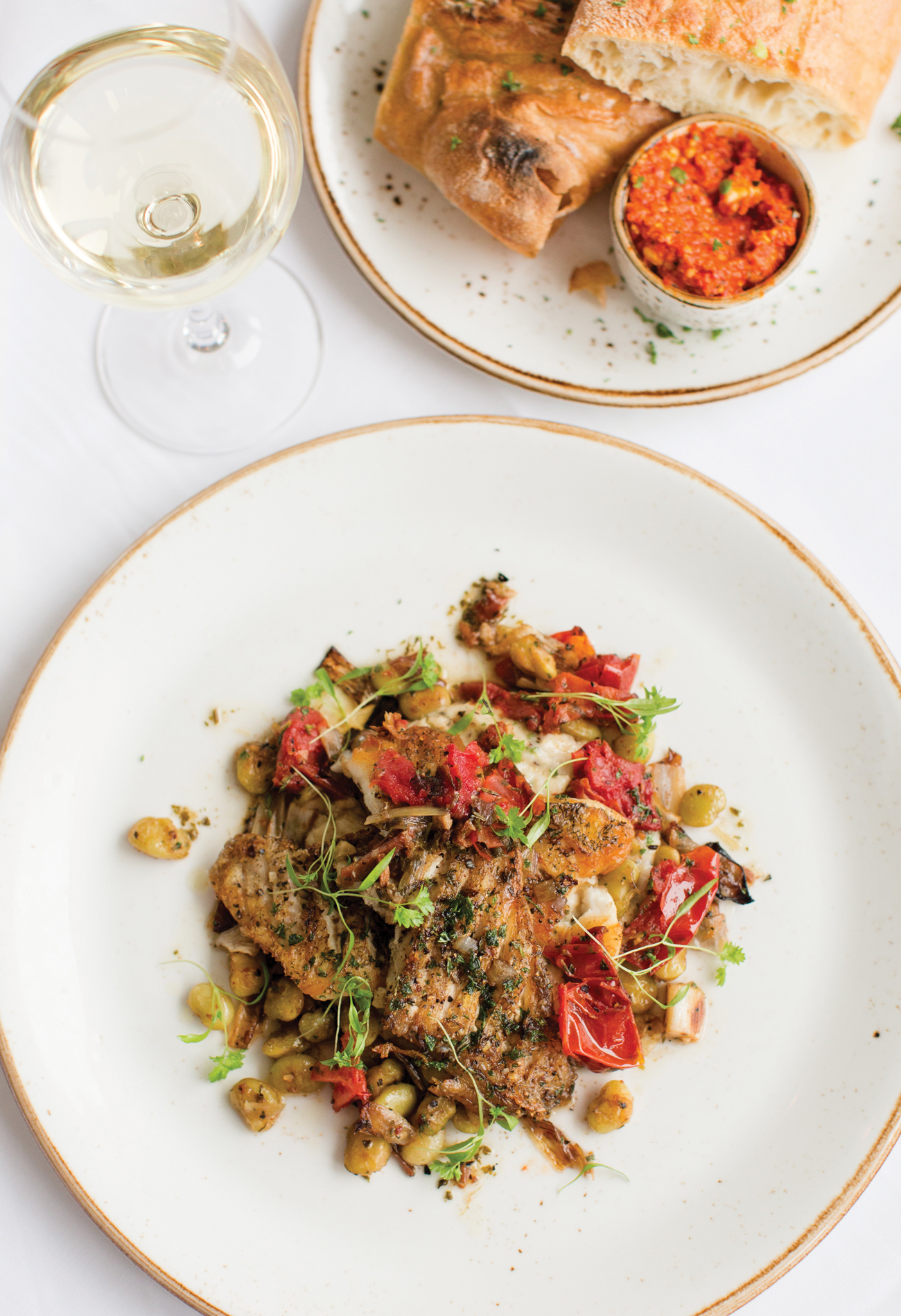
About 25 large mullet gather tightly together and swim very slowly in unison through the shallow waters of Cotton Bayou. The dock owned by the Perdido Beach Resort extends out some 250 feet over grass beds where minnows, crabs and stingrays alternately feed and duck for cover. There are not a lot of grass beds left along the highly developed inland coastline, so this small patch is a respite for inshore species.
Out in the open Gulf waters, however, local fish are having a hard time protecting themselves from one predator in particular. A beautiful striped fish that no other aquatic animal can touch swims in alarming numbers around reefs and rigs. It’s an invasive species that is reeking havoc on the natural balance: the lionfish.
First spotted in Gulf waters in 1985, this native of the Indo-Pacific was likely an aquarium pet that was released somewhere in Florida. It reproduces rapidly, and with no natural predators in this new environment, the lionfish has survived, thrived and multiplied. With a steady diet of just about anything, the zebrafish, as it is also known, is toppling a delicate ecosystem. It can now be found swimming anywhere from Delaware to Brazil.
I walk the dock in the late spring sunshine, chatting with chef Brody Olive about his introduction to lionfish. The executive chef at the Perdido Beach Resort is making it his mission to curb the invasion, one tasty appetizer at a time — a goal that is worthy but certainly not easy. His endeavor began in 2014 when Olive and local chef Chris Sherrill were cooking side-by-side at the Seafood, Science and Celebrity event on Dauphin Island, a Friends of James Beard Benefit Dinner featuring numerous Southern culinary icons. They struck up a conversation with some divers who were talking about spearfishing for lionfish in the Gulf of Mexico. Olive and Sherrill were intrigued and alarmed but determined. As if the lionfish had thrown down a gauntlet that the chefs simply must pick up, they founded a small nonprofit called The Nuisance Group to educate consumers about invasive species and to promote their inclusion on local menus. Fixing an environmental issue through delicious cuisine seemed like a win/win.

Beachgoers, however, tend to look for snapper, grouper and other large, recognizable names on menus; diners feel confident ordering them. But Olive wants to push diners at Voyager’s, the fine dining restaurant at the Perdido Beach Resort, to broaden their palate. The first step is educating patrons about underutilized fish, such as lionfish, and the second is helping them overcome their fears. “It’s a venomous fish,” he tells me, “but not a poisonous one. The meat is healthy and delicious, a delicate fillet with a buttery quality.” Once people try it, Olive hopes they will begin to recognize it on other menus or even ask for it by name.
Identifying the problem and creating a demand sounds like an easy way to eliminate this invasive species. But unless you plan to dive for them yourself, finding lionfish meat can be a challenge. They are not commercially fished in large numbers and spearfishing removes them at a much slower pace than nets or other fishing methods. And a labor-intensive product equals high prices.
“I’m not selling lionfish to make a profit,” Olive admits. “At $20 a pound, it can get pretty pricey.” Olive keeps it as an appetizer on his ever-changing menu so he can be sure not to run out. Even purchasing 200 to 300 pounds at a time can’t provide enough product for a regular entree portion. “We buy as much as we can find, whole, and then clean them and blast freeze them,” Olive tells me. “I don’t know how we cooked before the IQF freezer,” a device that allows the fish to stay as fresh as the day it swam.
Whole Foods offers lionfish in some of their Florida stores, but as of yet, no seafood markets in our area offer it. Those who dive will enjoy the hunt, but cleaning the fish around its venomous spines can be a little tricky. Seek help the first time you attempt it, Olive advises.
This spring, the Poarch Band of Creek Indians and the Coastal Conservation Association of Alabama put up $10,000 in prizes for a lionfish tournament that harvested 2,140 pounds of lionfish in just 10 days. A drop in the bucket, perhaps, but Olive appreciates the effort. “After a roundup, many people donate the fish to our restaurant since we are experienced and prepared to process and serve them. Nothing goes to waste.”
As we reach the end of the resort’s boardwalk, having watched stingrays and dolphins swim alongside charter boats and center-consoles out for a day of recreation, you can’t help but think about the impact one powerful species can have on an ecosystem. Olive smiles and puts back on his signature do-rag and sunglasses as he heads back toward his beachfront kitchen, confident in the knowledge that he is creating more than just delicious food. He is creating a legacy as well.

Pan-Roasted LionFish
4 lionfish fillets, or any smaller fish such as yellowtail snapper, mangrove snapper, flounder or tripletail
salt and pepper, to taste
4 tablespoons olive oil
1 sprig thyme
1 sprig parsley
1 clove crushed garlic
4 tablespoons butter
1/2 lemon
Lightly season fillets with salt and pepper. Heat cast-iron skillet over medium-high heat and add olive oil. Lay fish fillets flesh side down. Sear for approximately 2 to 3 minutes, depending on thickness of fillets. Flip fillets and turn heat off. Add sprigs of thyme and parsley. Add garlic and butter. Melt butter, then squeeze lemon into pan. With a tablespoon, scoop butter mixture back over fish 3 or 4 times. Serves 4.
Limas and Roasted Tomatoes
1 cup fresh or frozen lima beans
2 cups chicken or vegetable stock
2 tablespoons olive oil
1 spring onion bulb, chopped
4 ounces Divina roasted tomatoes, drained
1 teaspoon chopped garlic
1/4 cup white wine
1/2 ounce aged sherry vinegar
1 tablespoon butter
salt and pepper, to taste
Simmer lima beans in chicken or vegetable stock for 30 minutes or until tender. Drain and set aside. In medium saute pan, add oil. Heat over medium. Saute onion until lightly browned. Add roasted tomatoes, garlic and beans. Add white wine, and simmer for 8
minutes. Add vinegar and butter. Adjust seasoning with salt and pepper.
Heirloom Grits
2 cups water
2 cups heavy cream
1 cup Bayou Cora stone-milled heirloom grits*
1 tablespoon kosher salt
1 tablespoon butter
1 tablespoon fresh parsley
pepper, to taste
Bring water and heavy cream to a boil, being careful not to boil over. Whisk in grits. Add 1 tablespoon of kosher salt and reduce heat to low. Simmer grits, stirring occasionally, for 30 to 40 minutes. Add butter, parsley and pepper.

Fish Tiradito (Lionfish)
If unable to acquire lionfish, substitute another light fish, such as flounder.
1 lime, zested
1 orange, zested and juiced
1 teaspoon garlic, chopped
1 serrano pepper, finely sliced
1/4 cup green onion whites
turbinado sugar, to taste and garnish
6 ounces fish, sliced sashimi-style
Maldon salt, to taste and garnish
extra-virgin olive oil, for garnish
microgreen, for garnish
In a bowl, whisk together first six ingredients. Season with salt, to taste. Adjust acidity with sugar for spiciness. Place thinly sliced fish in center of serving plate; spoon sauce on and around fish. Garnish with salt, sugar, oil and microgreens. Serves 4.
Want To Go Spear Fishing?
The following charter boats will take you out to the lionfish and let you give it your best shot! Open water dive certification usually required.
Reel Surprise Charters
San Roc Marina, Orange Beach, AL | 251-981-7173
reelsurprisecharters.com
Gary’s Gulf Diver
Sportsman’s Marina, Orange Beach, AL | 251-747-6563
gulfdiver.net
Get In On The Action!
Another tournament kicks off this fall!
Orange Beach Open Spearfishing Tournament
September 27 – October 12, 2019
With $10,000 in cash prizes
alabamaspearfishing.com





